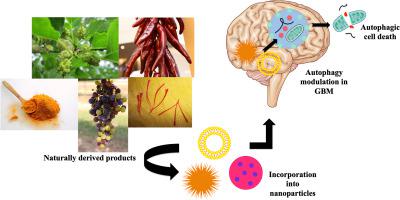Nanomedicine: Nanotechnology, Biology and Medicine ( IF 4.2 ) Pub Date : 2020-07-21 , DOI: 10.1016/j.nano.2020.102270 Srishti Agarwal 1 , Toru Maekawa 1

|
Glioblastoma is the most destructive type of malignant brain tumor in humans due to cancer relapse. Latest studies have indicated that cancer cells are more reliant on autophagy for survival than non-cancer cells. Autophagy is entitled as programmed cell death type II and studies imply that it is a comeback of cancer cells to innumerable anti-cancer therapies. To diminish the adverse consequences of chemotherapeutics, numerous herbs of natural origin have been retained in cancer treatments. Additionally, autophagy induction occurs via their tumor suppressive actions that could cause cell senescence and increase apoptosis-independent cell death. However, most of the drugs have poor solubility and thus nano drug delivery systems possess excessive potential to improve the aqueous solubility and bioavailability of encapsulated drugs. There is a pronounced need for more therapies for glioblastoma treatment and hereby, the fundamental mechanisms of natural autophagy modulators in glioblastoma are prudently reviewed in this article.
中文翻译:

天然物质的纳米递送作为胶质母细胞瘤中的预期自噬调节剂。
胶质母细胞瘤是由于癌症复发而在人类中最具破坏性的恶性脑瘤类型。最新研究表明,癌细胞比非癌细胞更依赖自噬生存。自噬被称为II型程序性细胞死亡,研究表明它是癌细胞向无数抗癌疗法的卷土重来。为了减少化学治疗的不良后果,癌症治疗中保留了许多天然来源的草药。另外,自噬诱导通过它们的肿瘤抑制作用发生,这可能引起细胞衰老并增加不依赖凋亡的细胞死亡。然而,大多数药物具有差的溶解度,因此纳米药物递送系统具有改善包封药物的水溶性和生物利用度的巨大潜力。











































 京公网安备 11010802027423号
京公网安备 11010802027423号